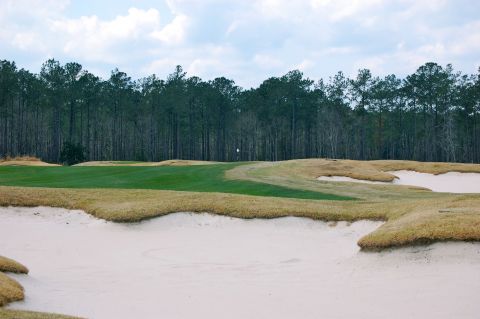Consider, for example, the state-by-state rankings. In South Carolina, Caledonia Golf and Fish Club in Pawleys Island is considered by most raters and vacationing golfers as one of the two or three best courses on the Grand Strand of Myrtle Beach.

Mike Strantz's Caledonia Golf & Fish Club layout in Pawleys Island, SC, is considered to be one of the top three on the Grand Strand of Myrtle Beach, but you wouldn't know it by reading Golf Digest's state rankings.
Across the border in North Carolina, that state’s golf ratings panel differs widely with Golf Digest’s assessments. Whereas the magazine rates Old North State Club and Pine Needles #13 and #16, respectively, the NC Rating Panel anoints Old North State the 3rd best in the state and Pine Needles #5. And whereas Golf Digest gives Wade Hampton its #1 ranking in the state, the state’s own rating panel drops it to #17. Golfweek, which always rates Wade Hampton highly, puts it at #19 among all golf courses built after 1960.
Some of the golf communities we have reviewed here fare well in the Golf Digest rankings, although the magazine’s raters appear to discount golf courses built with adjacent real estate. Near Charleston, the fine Golf Club at Briar’s Creek on Johns Island, designed by Rees Jones, ranks 13th in South Carolina; once the developer sells more land and builds a few more homes on the periphery of the golf course, count on that rating to drop. Haig Point, another Rees Jones layout on the troubled Daufuskie

The development called Briar's Creek on Johns Island, near Charleston, may have been a little slow to take off, but it is not for want of an excellent Rees Jones layout, which features a great Low Country combination of sand, marsh and live oaks (and a few dead ones).
Island, holds down the 17th position in the state; the nearby Daufuskie Island Resort went bankrupt, and no one stepped forward at auction early this year to make an offer. The Ralston Creek course at Daniel Island, yet another Rees Jones layout, sits at #19, two spots ahead of the challenging, smartly conditioned Jack Nicklaus layout at The Reserve at Lake Keowee. The Reserve recently introduced a trailblazing membership program that gives full-member status to the parents and children of members, no matter their ages. The Cliffs Communities’ two Tom Fazio courses are also represented on the South Carolina top 30 list -- Keowee Vineyards (#22) and Keowee Springs (#28). My own course, Pawleys Plantation (Nicklaus), is ranked 26th, a much more generous assessment than that given it by the SC Golf Rating Panel, where it barely makes the top 50 list at #49.
Golf Digest indicates that it must receive a total of 45 evaluations for a golf course over the past eight years for it to be eligible for ranking on America’s 100 Greatest, but only 10 evaluations for Best in State. Old Tabby Links, the stunning Ed Seay/Arnold Palmer course on private Spring Island, does not make either the Golf Digest or Golfweek lists. (The SC Panel ranks it 16th, which does not do it justice in my opinion). Note to Spring Island developers: Invite more raters to play the course. Old Tabby is much too good to be ignored.

Old Tabby Links on Spring Island, SC, does not show up in either the Golf Digest or Golfweek rankings. That's a shame, because the Ed Seay/Arnold Palmer layout is one of the best in the south.



























